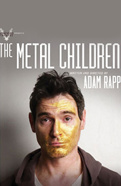Phoebe Strole on Spring Awakening Memories and Seducing Billy Crudup in The Metal Children
As Anna in Spring Awakening, Phoebe Strole was a sympathetic onstage presence but never really front-and-center. That’s certainly changed with her current star turn in The Metal Children, Adam Rapp’s timely drama about a banned young-adult novel. Cast as a precocious 16-year-old determined to live out the plotline of her favorite book, Strole holds her own in difficult scenes—including a bizarre hotel-room seduction—with Tony winner Billy Crudup as the troubled novelist. (To read Rapp’s First Person essay on the play, now at off-Broadway’s Vineyard Theatre, click here.) The friendly actress recently chatted with Broadway.com about her thriving career and the enduring legacy of Spring Awakening.
What a strange and fascinating play The Metal Children is.
It sure is strange! I think Adam Rapp is such an amazing voice of our time. He always says he’s not making a political statement, but his plays inevitably cause a political discussion of some kind. I loved the play and the character of Vera.
What drew you to the role?
It’s so rare to read a part for a young woman that is strong and driven. I love that she was written to be sexually confident. You read a lot of young characters who are sexually precocious, but not necessarily confident and intelligent. I consider myself a feminist, and I’m wary of a storyline that involves an older man sleeping with a teenage girl, but the way Adam handled it was so intriguing and so smart. Billy [Crudup] was sensitive to that, as well, and wanted to make sure everything that happens is justified.
Were you intimidated about going head to head with Billy Crudup onstage?
Of course. I think he’s phenomenal, and I admire not only his work but his career—the way he chooses what he does. Working with someone like Billy really pushes me every night, and I’m trying to learn as much as I can from him.
Your character is unnaturally obsessed with a novel written by Billy’s character. Were you ever that obsessed with a book?
Obsession is probably not the right word, but I remember reading The Catcher in the Rye when I was 12 or 13 and thinking that I didn’t know a book could tell a story that was so explicit and so honest from the point of view of a young person. I went to public school in Fort Worth, and that book opened my eyes to an artistic world I wasn’t aware of—nor had I any idea that I would end up in an artistic field.
So, how did you get from Texas to NYU’s Tisch School of the Arts?
As a teenager, I felt a little lost. I made these two friends who were just as dorky as I was, and through them, I got involved in the drama club at high school. It was something I found I could do well—I didn’t know I could sing until I opened my mouth! When I was 16, I got my first summer stock job as one of the screaming teenagers in Bye Bye Birdie at this theater called Casa Manana, and it was the happiest I had ever felt. I try to remember that feeling whenever I’m discouraged or disgruntled.
What was the highlight of your experience in the original cast of Spring Awakening?
One of the most amazing moments was when we performed on the Tonys. We had come from the safety of that smaller theater [at Atlantic], then we moved to the Broadway house, and all of a sudden, we were standing on this massive stage [at Radio City] before a massive crowd. Seeing the curtain come up and singing with my friends and castmates was one of most special moments I’m sure there will ever be in my entire life.
How many of the original cast members do you keep in touch with?
All of them. We always know what everyone else is doing, and we find a way to keep in touch and have mini-reunions. No matter what, if we needed each other, we would be there.
The night we saw The Metal Children, [Spring Awakening star] Jonathan Groff was on the aisle cheering.
I love him so much! He is such a supportive friend.
What was it like to be part of the L.A. production of Parade [with T.R. Knight, Charlotte d’Amboise, Michael Berresse and Christian Hoff] last fall?
Parade is one of those musicals I never saw, but I used to listen to the cast recording a lot in college and I’ve always loved [composer] Jason Robert Brown. It was a pared-down production, but really nice for me to get to spend a couple of months in L.A. One of the most amazing things was meeting Spring Awakening fans at the stage door. I wasn’t playing a main part in Parade by any means, but they would be waiting for me with the companion book of Spring Awakening, asking for my autograph.
The Spring Awakening fans are incredibly loyal.
They really are. A lot of them at the stage door hadn’t even seen the show in New York, but they knew the music and they were so appreciative. I remember how much I loved Rent in middle school and high school. I had no concept then of what it meant to live in New York. I didn’t know what Alphabet City was; I didn’t know what it meant to be bohemian, but Rent reached out to me in a way I could never quite explain. I can’t believe I was part of a show that has done that for young people. I don’t ever want to forget how special that was.

